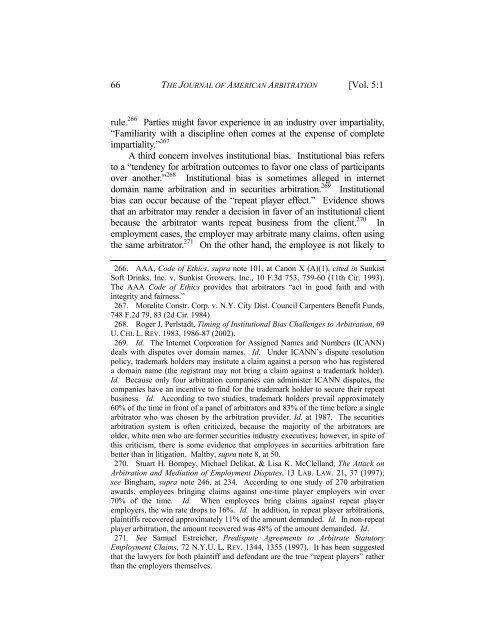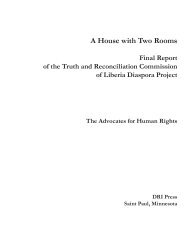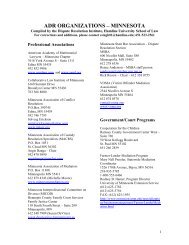2006/Vol. 5 No.1 - Hamline Law - Hamline University
2006/Vol. 5 No.1 - Hamline Law - Hamline University
2006/Vol. 5 No.1 - Hamline Law - Hamline University
You also want an ePaper? Increase the reach of your titles
YUMPU automatically turns print PDFs into web optimized ePapers that Google loves.
66 THE JOURNAL OF AMERICAN ARBITRATION [<strong>Vol</strong>. 5:1<br />
rule. 266 Parties might favor experience in an industry over impartiality,<br />
“Familiarity with a discipline often comes at the expense of complete<br />
impartiality.” 267<br />
A third concern involves institutional bias. Institutional bias refers<br />
to a “tendency for arbitration outcomes to favor one class of participants<br />
over another.” 268 Institutional bias is sometimes alleged in internet<br />
domain name arbitration and in securities arbitration. 269 Institutional<br />
bias can occur because of the “repeat player effect.” Evidence shows<br />
that an arbitrator may render a decision in favor of an institutional client<br />
because the arbitrator wants repeat business from the client. 270 In<br />
employment cases, the employer may arbitrate many claims, often using<br />
the same arbitrator. 271 On the other hand, the employee is not likely to<br />
266. AAA, Code of Ethics, supra note 101, at Canon X (A)(1), cited in Sunkist<br />
Soft Drinks, Inc. v. Sunkist Growers, Inc., 10 F.3d 753, 759-60 (11th Cir. 1993).<br />
The AAA Code of Ethics provides that arbitrators “act in good faith and with<br />
integrity and fairness.”<br />
267. Morelite Constr. Corp. v. N.Y. City Dist. Council Carpenters Benefit Funds,<br />
748 F.2d 79, 83 (2d Cir. 1984)<br />
268. Roger J. Perlstadt, Timing of Institutional Bias Challenges to Arbitration, 69<br />
U. CHI. L. REV. 1983, 1986-87 (2002).<br />
269. Id. The Internet Corporation for Assigned Names and Numbers (ICANN)<br />
deals with disputes over domain names. Id. Under ICANN’s dispute resolution<br />
policy, trademark holders may institute a claim against a person who has registered<br />
a domain name (the registrant may not bring a claim against a trademark holder).<br />
Id. Because only four arbitration companies can administer ICANN disputes, the<br />
companies have an incentive to find for the trademark holder to secure their repeat<br />
business. Id. According to two studies, trademark holders prevail approximately<br />
60% of the time in front of a panel of arbitrators and 83% of the time before a single<br />
arbitrator who was chosen by the arbitration provider. Id. at 1987. The securities<br />
arbitration system is often criticized, because the majority of the arbitrators are<br />
older, white men who are former securities industry executives; however, in spite of<br />
this criticism, there is some evidence that employees in securities arbitration fare<br />
better than in litigation. Maltby, supra note 8, at 50.<br />
270. Stuart H. Bompey, Michael Delikat, & Lisa K. McClelland, The Attack on<br />
Arbitration and Mediation of Employment Disputes, 13 LAB. LAW. 21, 37 (1997);<br />
see Bingham, supra note 246, at 234. According to one study of 270 arbitration<br />
awards, employees bringing claims against one-time player employers win over<br />
70% of the time. Id. When employees bring claims against repeat player<br />
employers, the win rate drops to 16%. Id. In addition, in repeat player arbitrations,<br />
plaintiffs recovered approximately 11% of the amount demanded. Id. In non-repeat<br />
player arbitration, the amount recovered was 48% of the amount demanded. Id.<br />
271. See Samuel Estreicher, Predispute Agreements to Arbitrate Statutory<br />
Employment Claims, 72 N.Y.U. L. REV. 1344, 1355 (1997). It has been suggested<br />
that the lawyers for both plaintiff and defendant are the true “repeat players” rather<br />
than the employers themselves.
















